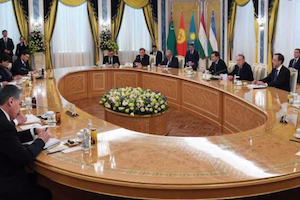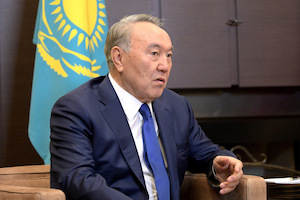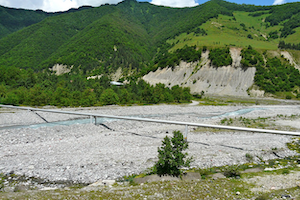Central Asia: Delayed Consultations, Suspended Integration
By Farkhod Tolipov
July 2, 2019, the CACI Analyst
After almost a decade-long break in regional summits of Central Asian states, the ice began to melt in March 2018 when the leaders of five Central Asian states met in Kazakhstan’s capital Astana for a so-called Consultative Meeting. Many observers termed the event a revitalization of the regional cooperation process, albeit in a new temporary format for talks, and a cautious step toward a regional approach to regional problems. During that first Consultative Meeting, it was decided that the second meeting would take place in Tashkent in March 2019. However, when March came the meeting was rescheduled for April and is still delayed.

Connecting Eurasia: Is Cooperation Between the EU, China and Russia Possible in Central Asia?
Connecting Eurasia: Is Cooperation Between the EU, China and Russia Possible in Central Asia?
By: Fabienne Bossuyt
Given the ongoing tensions between the EU and Russia, only few experts will give serious thought to the prospect of trilateral cooperation on connectivity between the EU, China and Russia in Central Asia. However, as China further embarks on implementing its Belt and Road Initiative (BRI) and remains firmly set on pursuing the ambitious goal of connecting China overland with Europe, the EU and Russia – as indispensable stakeholders for any Eurasian land bridge to successfully materialize – have been developing policy responses to China’s initiative that reveal an unexpected willingness to cooperate. In scrutinizing the likelihood of cooperation on connectivity between the EU, China and Russia in Central Asia, this article identifies the common interests between the three sides, and highlights to what extent cooperation between them is possible in Central Asia. In doing so, the article points to the main opportunities while outlining the main bottlenecks, which mostly stem from these actors’ diverging beliefs and approaches to connectivity and development. After touching upon the scope for cooperation between the EU, Russia and China, the remaining part of the article focuses on possible cooperation between the EU and China.
Converging Interests
Although trilateral cooperation between the EU, China and Russia on connectivity in Central Asia seems practically impossible in the short term due to the ongoing tensions between the EU and Russia, there does appear to be scope for cooperation between the three. The three sides have a common interest in advancing connectivity along the two transport corridors between China and Europe that pass through Russia. Of those two corridors, the New Eurasian Land Bridge passes through Central Asia, namely through Kazakhstan, while the China-Central Asia corridor is supposed to link up to the New Eurasian Land Corridor. Both the EU and China are aware that they need Russia’s support and involvement if these transport corridors are to be successfully completed.
The EU even recognizes this formally. In the EU’s strategy for Central Asia, which has just been redesigned, connectivity will be identified as one of the areas where possible synergies with Russia should be established. However, it remains to be seen how this will be achieved in concrete terms. Despite this common interest between the EU and Russia, there remains a profound lack of political willingness on both sides to cooperate.
This is different for Russia and China. They have already formally aligned themselves by linking up the Eurasian Economic Union EAEU) to the BRI, although in terms of practical implementation on the ground, progress remains limited.
Russia would also like the EU to formally engage with the EAEU. This would feed into Russia’s conception of the Greater Eurasian Partnership, stretching from Lisbon to Vladivostok. But for the time being, the EU is not willing to formally align itself with the EAEU. This is not only because of the conflict in Ukraine, but also because the EU has several concerns about the incomplete nature of the EAEU as an economic union.
Sino-European Cooperation
When it comes to possible cooperation on connectivity between the EU and China in Central Asia, there seems to be a much stronger basis. Both sides have already repeatedly mentioned that they want to establish synergies between them to jointly advance connectivity in Central Asia. So far, there has not been any cooperation between them on the ground in Central Asia, but there are several signs that it might only be a matter of time before this will happen.
A first concrete sign that the EU and China may cooperate on connectivity in Central Asia has come from the EU-China Connectivity Platform, which was established in 2015. The overall goal of the Platform is to strengthen synergies between the BRI and the EU’s connectivity initiatives. One of the specific objectives of the Platform is to support the implementation of infrastructure development in the relevant countries and regions situated along the corridors between China and Europe.
There has already been concrete progress in this regard. A long list of pilot projects has been established, and an expert group consisting of representatives of the European Investment Bank, European Bank for Reconstruction and Development (EBRD) and China Development Bank (CDB) has been created to work on the financing arrangements for these pilot projects. So far, the focus has been on infrastructure development in European countries and China, but clearly, if these pilot projects are successful, then eventually the EU and China could also agree to jointly finance and implement infrastructure projects in Central Asia. However, this is unlikely to happen in the short term due to the EU’s concerns about the Central Asian states’ huge debts to China.
Under the framework of the Connectivity Platform, the EU and China have agreed that projects implemented under this framework will abide by market-based principles and international norms and that they will promote openness, transparency and a level playing field in the projects that they will implement jointly. This point is a crucial condition for the EU to agree to cooperate with China on connectivity, as is clearly outlined in the EU’s Connectivity strategy, which was presented in September 2018.
According to this strategy, the EU will promote an approach to connectivity that is sustainable, comprehensive, and rules-based. This European approach is based on high standards of social and environmental protection and is inspired by the EU’s internal market, enabling countries to achieve higher levels of quality of life while guaranteeing respect for individual rights.
At the ASEM Summit meeting in Brussels in October 2018, the EU and China further agreed to aim towards creating additional synergies between China’s Belt and Road Initiative and the EU’s connectivity strategy.
The SDGs as a common denominator
The EU’s and China’s commitment to cooperate on connectivity and other development issues is now increasingly linked to the goal of achieving the Sustainable Development Goals (SDGs) of the UN’s 2030 agenda, of which both the EU and China are strong advocates. As the EU has outlined in its European Consensus on Development, it wants to engage more closely with China as part of a new partnership towards achieving the SDGs. This commitment has been confirmed at the highest political levels, including at the 20th EU-China Summit in July 2018, where the EU and China agreed to “promote mutual understanding and share experience on international development cooperation through enhanced exchanges, and make joint efforts to implement the 2030 Sustainable Development Agenda.” In their Joint Statement at the end of the summit, the two sides stressed that their cooperation on connectivity should improve not only the economic but also the social, fiscal, financial and environmental sustainability of Europe-Asia connectivity. They also agreed that such cooperation should abide by the shared principles of market rules, transparency, open procurement and a level playing field for all investors, and comply with established international norms and standards.
Central Asia has come up as a region where this cooperation may materialize. For instance, in the new EU Strategy for Central Asia, which will be launched in the course of 2019, it will be mentioned that the EU wants to increase synergies with China in Central Asia, including in the framework of connectivity and the SDGs.
Initially, there were strong concerns that cooperation would be difficult to achieve due to the EU’s and China’s diverging understanding of connectivity, and of development more generally, which, moreover, they pursue by means of entirely different methods. When it comes to development cooperation, the EU prioritizes inclusive and sustainable development. The EU believes that development can only be durable if it accompanied with enhancements in governance. In contrast, China focuses mostly on enabling economic growth through the improvement of infrastructure. Unlike the EU, it does not seek to directly improve governance issues, because it adheres to the principle of non-interference and the primacy of the national sovereignty of states.
Today, it seems that both actors are increasingly finding a common language by linking their cooperation commitment to the SDGs. This is directing China to converge more towards the understanding that the EU has of connectivity and of international development. For instance, China no longer wants to focus solely on economic development, but it is now also ready to implement projects that are aimed at boosting social development and environmental protection.
Cooperation in Practice
At the practical level, it still remains to be seen what cooperation between the EU and China will look like – several hurdles still remain due to the very different nature of their implementation methods and approaches.
One option that may be possible in the short-term is cooperation in the form of “blending,” whereby the EU may provide a grant to complement a loan extended by the EBRD, which may then be topped up by a loan from the China-dominated Asian Infrastructure Investment Bank (AIIB).
The EBRD is already co-financing loans with the AIIB for projects in Central Asia. Since the EU often cooperates with the EBRD in Central Asia, it only takes a small step to materialize this type of joint financing schemes.
In November 2018, a first step in this direction was already taken, as the European Development Commissioner Neven Mimica spoke to the President of the EBRD and the President of the AIIB about the potential to join forces on shared priorities.
In the longer term, direct cooperation between the EU and China’s development banks, like the China Development Bank and the Silk Road Fund, may be possible. This is now already happening in Europe and in China in the framework of the EU-China Connectivity Platform and also in Europe under the China-EU Co-investment Fund Program, which was established by the European Investment Fund and Silk Road Fund with the aim of developing synergies between the Belt and Road Initiative and the Juncker Plan.
However, as already mentioned, in Central Asia such direct cooperation between the EU and China’s development banks is unlikely to happen in the short term, because of the EU’s concerns about the huge debts that the Central Asian states already have from China.
Conclusions
While it is clear that cooperation on connectivity between the EU and Russia in Central Asia is not likely to happen in the short term due to the ongoing tensions between them, their common interest in advancing connectivity along the transport corridors between China and Europe that pass through Russia has led to both sides showing a willingness to cooperate. Nevertheless, it remains to be seen how this willingness will translate into concrete measures. In turn, the likelihood of cooperation between the EU and China in Central Asia is starting to move beyond the stage of declaring a willingness to cooperate. Several opportunities for cooperation are emerging, as the EU and China have found a common language in the SDGs. By linking its cooperation commitment to the SDGs, China is converging towards the EU’s understanding of connectivity and of international development, which has made the EU feel more comfortable about the possibility of cooperating with China on connectivity. Still, several hurdles remain to cooperation due to the very different nature of China’s and the EU’s implementation methods and approaches. Therefore, only indirect cooperation seems likely in the short term, namely in the form of co-financing between the EBRD and the AIIB. In the midterm, direct cooperation between the EU and China’s development banks, such as the China Development Bank and the Silk Road Fund, may become possible provided that China can address the EU’s concerns over the Central Asian countries’ Chinese debts.
Fabienne Bossuyt is Assistant Professor at the Department of Political Science, Ghent University. This article is based in part on the author’s report from a panel at a Conference entitled “EU-Central Asia Relations”, organized by the EU Special Representative for Central Asia in Brussels. The views expressed in this article are those of the author only, and do not represent those of the European Union.
Why Kazakhstan's Presidential Elections Matter
By Rafis Abazov
May 23, 2019, the CACI Analyst
The resignation of Kazakhstan’s President Nursultan Nazarbayev in spring 2019, after 30 years of uninterrupted stewardship, had an unexpected timing. However, even more unexpected was the Parliament of Kazakhstan’s hastily announced early presidential elections scheduled for June 9, 2019. Even some major political insiders were caught unprepared. Indeed, leading local analyst Sergei Domnin of Expert Magazine wrote that the entire political establishment woke up to find Kazakhstan at a political “crossroad.” Some believe that the elections are just a face change and that the ruling elite will continue to pursue the same policies. Others claim that the elections could lead to the emergence of an “entirely new political model.”

Central Asian Salafi-Jihadi and Al Qaeda: From Bayat to Global Jihad
By Uran Botobekov
May 2, 2019, the CACI Analyst
In January 2019, the Central Asian terrorist group Katibat Tawhid wal Jihad (KTJ) publicly renewed its Bayat (oath of allegiance) to Ayman al-Zawahiri, al Qaeda’s global chief. More than seven years after the killing of Osama bin Laden, al Qaeda continues to attract Central Asian Salafi groups. This trend has intensified since the start of the Syrian civil war, where several thousand radical Islamists from Central Asia went to wage Jihad. The conflict has allowed al Qaeda to claim Syria as its newest and most important safe haven for a global Jihad ideology. The ideological assimilation of the Central Asian groups with al Qaeda took place precisely in Syria.

Armenia's Gas Dispute with Russia
By Natalia Konarzewska
April 29, 2019, the CACI Analyst
In March 2019, two high-ranking Armenian officials revealed that Armenia and Russia have not yet reached an agreement on the price of natural gas. Negotiations on gas tariffs are ongoing and remain high on the bilateral agenda. In late December 2018, Gazprom announced that it will raise gas prices for Armenia in 2019. Subsequently, Armenia has sought to reduce the price for Russian supply, with little success. In a move to improve Armenia’s negotiating position vis-a-vis Russia, Yerevan started to explore the possibility of importing gas from Iran. The gas row comes amid heightened tensions in post-revolutionary Armenia’s relations with Russia. Moscow has traditionally used its gas deliveries as a lever in bilateral relations and now routinely expresses its distrust in Nikol Pashinyan’s government.



